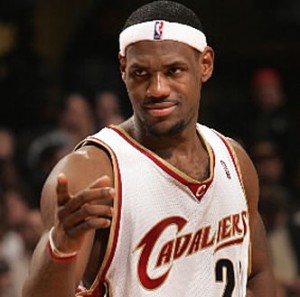 There are several recruiting lessons to be learned from the bomb that LeBron James dropped on Cleveland late last night about his departure to the Miami Heat. Before we get into those lessons, let’s take a quick look at some of the highlights of LeBron’s NBA career with the Cavs:
There are several recruiting lessons to be learned from the bomb that LeBron James dropped on Cleveland late last night about his departure to the Miami Heat. Before we get into those lessons, let’s take a quick look at some of the highlights of LeBron’s NBA career with the Cavs:
- 2003: selected by the Cleveland Cavaliers as the first overall pick in the NBA Draft; signed a three-year, $12.9 million contract
- 2004: named 2003–04 NBA Rookie of the Year
- 2004-2005: selected to his first NBA All-Star Game
- 2005-2006: named as one of the candidates for the NBA Most Valuable Player Award
- 2006: negotiated a three-year, $60 million contract extension, with a player option for a fourth year, to begin in the 2007-2008 season
- 2007-2008: won the 2008 All-Star Game MVP
- 2008-2009: wins NBA Most Valuable Player award
- 2009-2010: wins 2nd NBA Most Valuable Player award
- July 2010: contract with Cleveland expires; becomes a free agent, meets formally with the New York Knicks, Chicago Bulls, and New Jersey Nets
Make no mistake about it; this guy is Talented. With a capital “T”. But it takes more than one guy to make a team, as Cleveland has surely learned. Just a couple of lessons to glean from this entire situation:
Don’t build your kingdom around one person. Whether you are hiring people for your office or assisting clients in their hiring needs, it’s important not to rely solely on one individual. For example: if you have a superstar candidate lined up to interview with a client, make sure you have others to present as well who are also excellent players. Remember – clients’ needs will vary and someone who might not seem to be the best candidate could turn out to be exactly what they’re looking for. Think of it this way – ever heard of a guy named Shaquille O’Neal? Yeah – he was also a Cleveland Cavalier last season (this is bound to change).
The best players aren’t always the right players. Think of the quote from Herb Brooks in the movie Miracle: “I’m not looking for the best players, Craig. I’m looking for the right ones.” In the seven years that James has been with the Cavs, he still has yet to win an NBA Championship. Sure, they’ve made it to the Playoffs five times, but as any winner will tell you, the ultimate prize is winning it all. When placing or hiring “A” players, it is important to take this into consideration. They may be a superstar, but is their working style going to mesh with your client’s company? When you’re hiring for yourself, these are also things to consider. For the Cavs, perhaps losing LeBron will be the best thing for the team as a whole. Only time will tell.
Money isn’t the only motivator. There is a billboard near Quicken Loans Arena that says, “Born Here. Raised Here. Plays Here. Stays Here.” Cleveland has been reminding James of his roots for quite some time now to encourage him to stay. He makes a lot of money, but as with most people who play at his level, sometimes the biggest motivators don’t have a dollar sign attached to them. In a Bloomberg Businessweek article written in June, Arizona State University president Michael M. Crow is quoted saying, “A world-class athlete is fundamentally no different than a world-class scientist…They are interested in finding a way to express everything that they have without limit so that they can gain recognition.” Recognition, proximity to family/friends, recreation, creative freedom, and so forth are all motivators that don’t necessarily have pricetags attached to them but can be huge deciding factors when working with candidates.
There will always be new (and better?) talent coming up. When your superstar candidate decides to take an offer elsewhere, it is disappointing for sure. But keep in mind the old cliche that there are always other fish in the sea. James is not the only talented player in the NBA. He’s also not the last of the talent available out there – just look at the guys coming up from this year’s draft. Superstars come into their own all the time, which is why it’s always a good idea to track careers of promising individuals and take an interest in them early on. They will remember your interest as they become successful which could mean placements, referrals, and/or new clients for you.
What other recruiting lessons do you think can be learned from LeBron’s departure? Share your thoughts in the comments below!